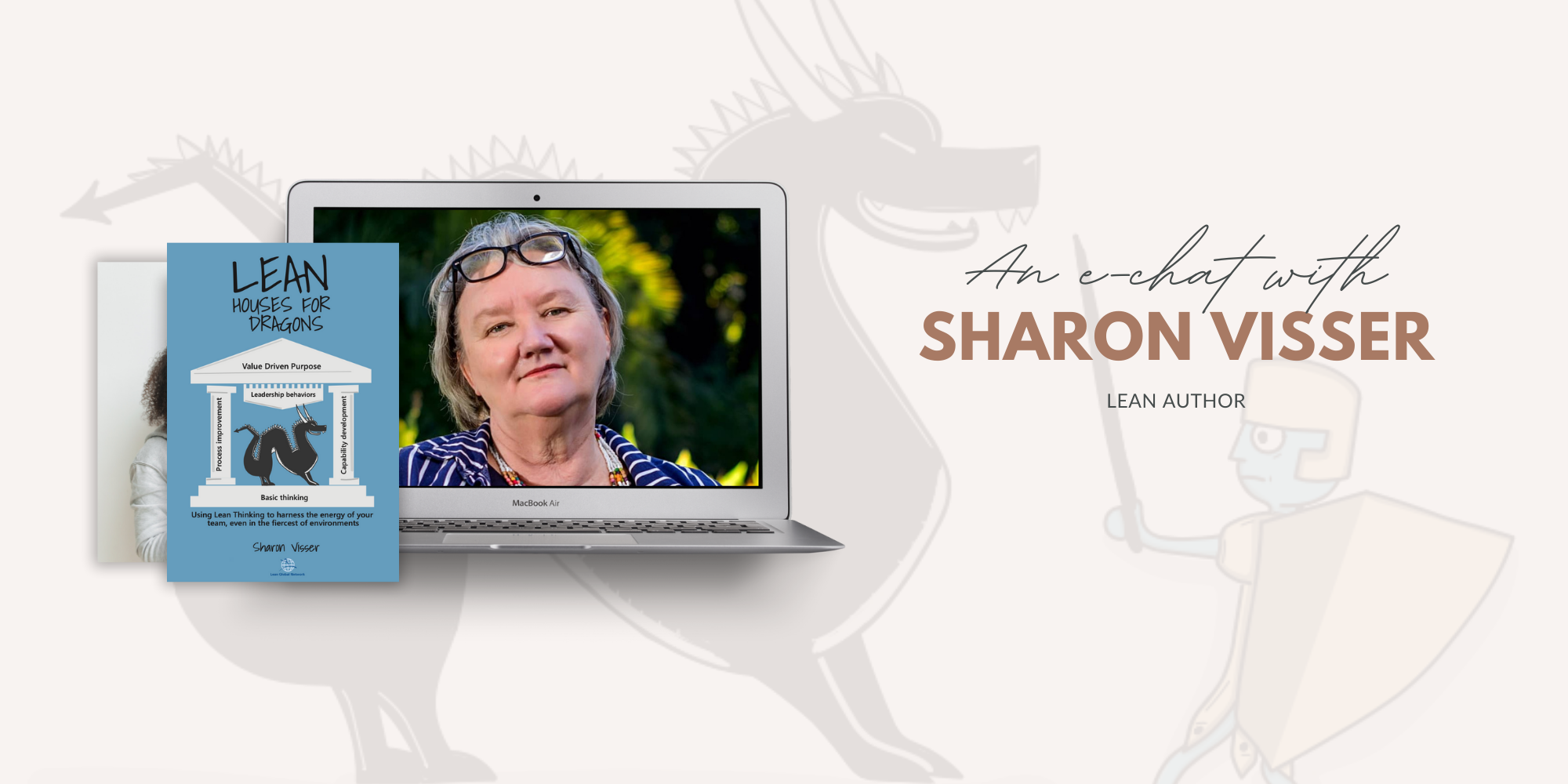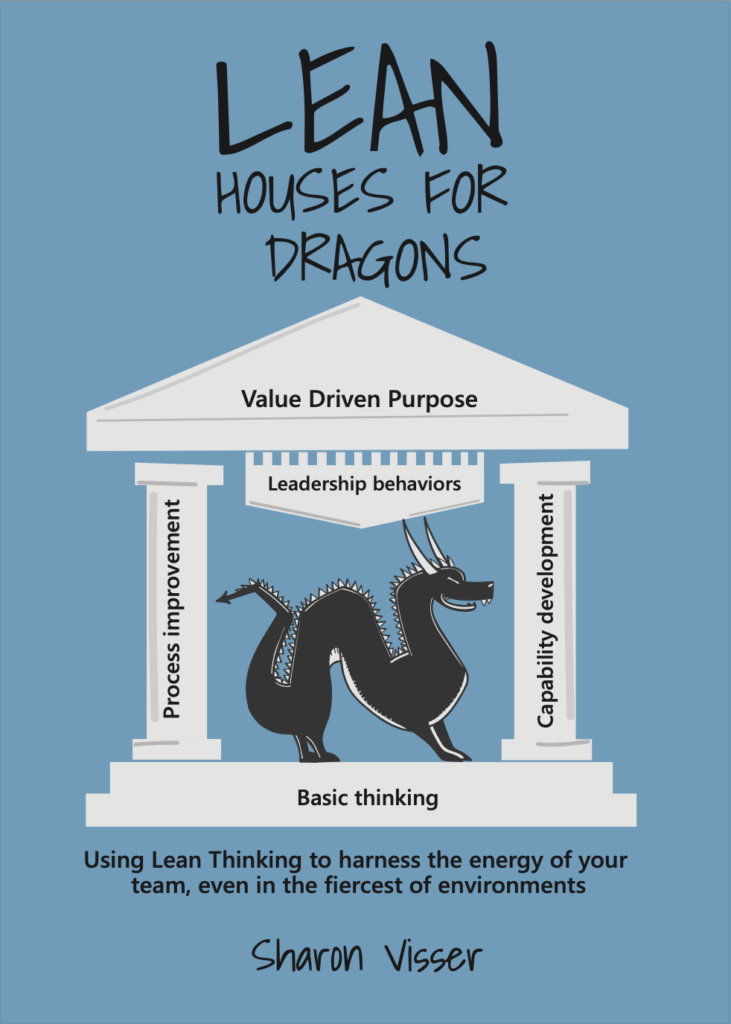
Becoming comfortable with the uncomfortable
INTERVIEW – Our editor chats with Lean Houses for Dragons author Sharon Visser. They discuss her book, what fear can do to a transformation and the power of storytelling.
Interviewee: Sharon Visser
Roberto Priolo: Lean Houses for Dragons came out a couple of months ago. How has it been received by the lean community?
Sharon Visser: Rather than answering this question myself, let me share with you a few words by Terry O’Donoghue, one of the “lean knights” who supported our transformation at Ngami: “This book was a joy to read. It is written in plain English, hence very accessible to a novice and beginner on this journey and easy and interesting to follow. The focus is on implementation, which is really refreshing (as opposed to “this is what Lean is and this is how to do it”. The PDCA (not just PDCA but PDCAR – where the R stands for “Reflect”) comes out strongly - and in this Sharon is willing to expose herself and be vulnerable. Her book is really the "R". That takes courage and adds to the authenticity of the book. What I had not realized till I read the book was how an almost incidental by-product of focusing on developing people and improving processes was the increase in profit and cash flow, to the extent of being able to open another Halfway branch in Kasane. That really is astonishing and very powerful. The achievements of the Lean implementation were not limited to the personal growth of each employee. Ngami’s story shows that by investing in people (which is very hard work and not to be underestimated), you improve the bottom line. Lean really is a no-brainer, and when read the book you have to ask yourself, “Why doesn't everybody do it?”.
RP: Let me ask you... why did you choose the dragon metaphor? Are there even dragons in Africa?
SV: I think that all cultures have mythical beasts. Within its many legends, Africa has serpent-like creatures similar to dragons. For example, Grootslang of South Africa, Ikanyamba in the Zulu legends, or Kongamato in Zambia.
I have always felt that dragon myths represent the fears and concerns of a community or culture (an organization is also a community with a culture), a kind of warning telling us not to go there. When employees fight back against change, it is mostly out of fear; it is a response to the unknown (or shall we say, mythical). This way they build their own dragon without realizing it. One cannot see it, but it is powerful, and it can do great damage to leadership and opportunities to change for the better.
RP: Your storytelling is wonderful, and very personal. In your opinion, what is the advantage of telling stories this way? (As opposed to a more traditional, manual-style way, I guess.)
SV: Roberto, I have always loved reading but story telling is new to me. It kind of crept up on me with age, as I got to a place where I realized I had a story to tell. I think that a story is easier to remember, and less intimidating. They can stimulate the creative side in all of us. We all have it, that’s the way we are designed.
RP: What is the most important lesson you have learned at Ngami over the years?
SV: My goodness, so many lessons! The biggest one was, perhaps, a confirmation that everything my mother taught me about people was true. Whatever creed, culture or race, people just want you to know that you care about them.
RP: What is unique about Ngami's story and why should people want to read your book?
SV: Once they put the book down, I’d like people to think, “If they can do it, so can we.” I am hoping that by making myself vulnerable in this story, I can help others to understand that lean may raise certain emotions that make us uncomfortable, but that once we push past them, we become comfortable with the uncomfortable. In doing so, readers will not only develop others, but also develop their own skills. That’s when they will really be on their way to becoming a dragon whisperer. Maybe even a master dragon whisperer.
RP: In your mind, what is preventing leaders from embracing Lean Thinking wholeheartedly?
SV: FEAR, in capital letters. Fear of change, fear of failure, fear of not being recognized for promotion, fear of what lean might reveal, fear of taking responsibility, fear of losing the status quo. The list goes on and on. Lean has so many proven benefits, and the only thing that can stop it is fear. This is why I am so passionate about addressing the emotions of lean in my book. I am hoping that by doing so I will decrease the fear factor and help others to work through the fear we are not supposed to be feeling because “we are professionals”
RP: You recently relocated from Botswana to Portugal. What a change! How has it been and what are your lean plans?
SV: Obviously, it has been a big move from Africa to Portugal. Traveling during Covid has been a challenge. Having said that, Portugal has been kind and welcoming. I will continue to coach online with specific clients in Africa but will also be working on a book about visuals and developing bespoke lean visuals and games. I may be far away from Botswana now, but the fact that the internet is so much faster in Europe than it is in Botswana is a huge benefit for my clients: I can have better access to their facilities, digitally. I am hopeful that I will get some opportunities in Europe to practice lean and help organizations to transform.
Buy your copy of Lean Houses for Dragons today!

The e-book can be purchased here.
UK readers can purchase a print copy here. Readers from the rest of the world here.
THE INTERVIEWEE

Read more


FEATURE – In the lean world, we are used to acronyms and abbreviations. But what’s the value of words if their meaning is lost and fails to reach those we are communicating with?


CASE STUDY – TechnipFMC has introduced the Concept Paper in its lean product development process. This article shares some of the learnings resulting from the experience.


FEATURE – At the 2016 Olympics in Rio, the Japanese Men’s 4x100m relay team went from being the underdogs to winning a silver medal by apply lean problem solving.


FEATURE – The use of TWI is widespread, but course material doesn’t tell us much about rolling out programs and ensuring their sustainment over time. The authors come to the rescue, discussing how we can ensure the success of TWI.

